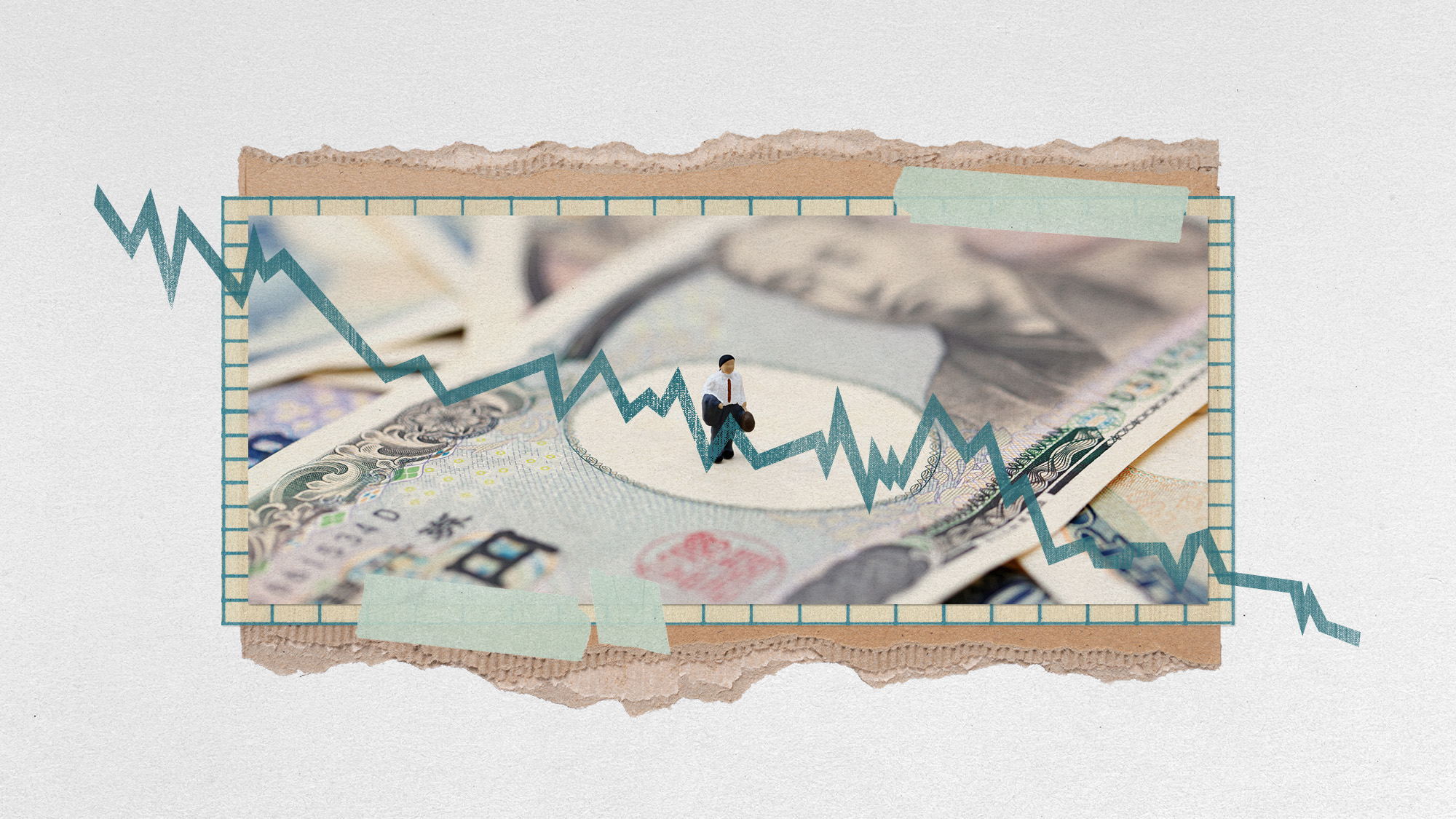The precipitous fall of the Japanese yen
The Yen recently below 160 to the dollar, its lowest value in more than 30 years


A free daily email with the biggest news stories of the day – and the best features from TheWeek.com
You are now subscribed
Your newsletter sign-up was successful
Japan's economy has not had a good 2024, to say the least. It entered a short recession in February and now is dealing with a crisis surrounding the nation's currency, the yen. The currency's exchange rate has been seeing a continuous slide, recently weakening to 160.86 against the U.S. dollar and 171.79 against the euro. This marks the yen's lowest value against the dollar since 1986, and its lowest value against the euro ever.
This unprecedented low values had some wondering how other nations would react to the ongoing issues within Japan's economy — specifically whether or not foreign markets would intervene in an attempt to stop the slide. How did Japan's currency get here, and why are many industry experts blaming the United States?
Why is the yen losing value?
There are several factors, but it is mainly a "product of divergent monetary policy between the Bank of Japan and its developed-market peers — particularly the Federal Reserve," said Barron's. This is the result of a wide difference in interest rates between the U.S. and Japan; the Bank of Japan "has only just begun to ease off intense monetary stimulus, while the Fed and other central banks are years into tightening cycles."
The Week
Escape your echo chamber. Get the facts behind the news, plus analysis from multiple perspectives.

Sign up for The Week's Free Newsletters
From our morning news briefing to a weekly Good News Newsletter, get the best of The Week delivered directly to your inbox.
From our morning news briefing to a weekly Good News Newsletter, get the best of The Week delivered directly to your inbox.
The Bank of Japan has attempted to "normalize monetary policy" by "lifting its benchmark interest rate out of negative territory," said Barron's. But these efforts have been "dwarfed by the Fed's interest-rate hikes starting in 2022," and this "wide gap sets up a popular so-called carry trade for Japanese investors and institutions that puts pressure on the yen."
This interest rate gap "reflects the very different inflation environments in the U.S. and Japan," said Al Jazeera. Japan has "struggled to get prices and wages to rise after decades of economic stagnation" while the U.S. "has been battling to bring prices down amid robust economic growth." This has made Japan one of few countries that has "maintained rock-bottom borrowing costs in an effort to shake the economy out of a prolonged stagnation known as 'the lost decades.'" But the trend is not entirely new; The currency "has been on a continual slide since early 2021" and "over the last three years, the yen has lost more than one-third of its value."
How can the yen be saved?
The "grim reality" is that the "slide won't stop until the Federal Reserve relents on its higher-for-longer policy path. And [Japanese officials] have no control over that," said Bloomberg. Beyond this, all "efforts by officials in Tokyo to prop up the yen so far have fallen flat."
Japan has said it will take the required actions to stop the yen's bleeding. It is "desirable for exchange rates to move stably. Rapid, one-sided moves are undesirable. In particular, we're deeply concerned about the effect on the economy," Japanese Finance Minister Shunichi Suzuki said, per Reuters. The government is "watching moves with a high sense of urgency, analyzing the factors behind the moves, and will take necessary actions."
A free daily email with the biggest news stories of the day – and the best features from TheWeek.com
But there are doubts as to whether any actions "can reverse the weak-yen tide that is driven mostly by uncertainty over how soon the U.S. Federal Reserve will start cutting interest rates," said Reuters. While the Bank of Japan has signaled that it will likely raise interest rates, an "increase in the current near-zero short-term policy target will still keep Japan's borrowing costs very low," meaning the yen would remain mostly stagnant.
And any small rate hikes are "unlikely to satisfy the market and intervention now is pretty much the only option for Japan to slow down the weakening," Tsuyoshi Ueno, an economist at NLI Research Institute, said to The Japan Times. But not all the news is bad. If inflation continues falling in the United States, it "could very quickly change the outlook for the interest rate gap between the dollar and the yen, and the Japanese currency could make a dramatic comeback," said the outlet.
Justin Klawans has worked as a staff writer at The Week since 2022. He began his career covering local news before joining Newsweek as a breaking news reporter, where he wrote about politics, national and global affairs, business, crime, sports, film, television and other news. Justin has also freelanced for outlets including Collider and United Press International.
-
 The ‘ravenous’ demand for Cornish minerals
The ‘ravenous’ demand for Cornish mineralsUnder the Radar Growing need for critical minerals to power tech has intensified ‘appetite’ for lithium, which could be a ‘huge boon’ for local economy
-
 Why are election experts taking Trump’s midterm threats seriously?
Why are election experts taking Trump’s midterm threats seriously?IN THE SPOTLIGHT As the president muses about polling place deployments and a centralized electoral system aimed at one-party control, lawmakers are taking this administration at its word
-
 ‘Restaurateurs have become millionaires’
‘Restaurateurs have become millionaires’Instant Opinion Opinion, comment and editorials of the day
-
 Is the US in a hiring recession?
Is the US in a hiring recession?Today's Big Question The economy is growing. Job openings are not.
-
 Trump wants a weaker dollar, but economists aren’t so sure
Trump wants a weaker dollar, but economists aren’t so sureTalking Points A weaker dollar can make imports more expensive but also boost gold
-
 Why quitting your job is so difficult in Japan
Why quitting your job is so difficult in JapanUnder the Radar Reluctance to change job and rise of ‘proxy quitters’ is a reaction to Japan’s ‘rigid’ labour market – but there are signs of change
-
 Why Saudi Arabia is muscling in on the world of anime
Why Saudi Arabia is muscling in on the world of animeUnder the Radar The anime industry is the latest focus of the kingdom’s ‘soft power’ portfolio
-
 Tariffs have American whiskey distillers on the rocks
Tariffs have American whiskey distillers on the rocksIn the Spotlight Jim Beam is the latest brand to feel the pain
-
 The longevity economy booms as people live longer
The longevity economy booms as people live longerThe Explainer The sector is projected to reach $27 trillion by 2030
-
 How will China’s $1 trillion trade surplus change the world economy?
How will China’s $1 trillion trade surplus change the world economy?Today’s Big Question Europe may impose its own tariffs
-
 Texas is trying to become America’s next financial hub
Texas is trying to become America’s next financial hubIn the Spotlight The Lone Star State could soon have three major stock exchanges
